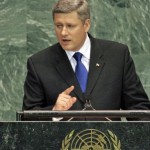Don't Blame Harper for Canada's UN Rejection

Canada’s non-election to the UN Security Council is a disappointment to Canadians and a real loss to the UN system. But the greatest disappointment of all has been the exploitation of the disappointment by partisan groups advancing narrow agendas.
The Sierra Club suggested that Canada lost because Canada has withdrawn from the Kyoto accord on climate change. Anti-Israel voices inside the Canadian civil service have murmured to friendly journalists that Canada was punished for Prime Minister Harper’s staunch support for the Middle East democracy. Personally, I’m waiting for somebody to suggest that Canada lost because Maclean’s magazine’s coverage of corruption in Quebec offended La Francophonie.
These statements are self-interested and polemical — and also reveal a weak understanding of the workings of the United Nations.
The Security Council has 10 temporary members, each serving a two-year term. Theoretically, those 10 temporary members are elected by the General Assembly by secret ballot. In the first round of balloting on October 12, Canada received 114 votes, 13 votes short of the two-thirds majority needed to win.
And yes, in that balloting, it’s very possible that the Islamic bloc at the UN voted for Portugal over Canada. But it’s not the voting that matters at the UN. It’s the nominations.
The temporary Security Council seats are assigned to regional blocs. Five seats become available January 1, 2011. One of those seats is assigned to the African bloc. One is assigned to the Asian and Arab bloc, one to the Latin American and Caribbean bloc, and two to the bloc to which Canada belongs: Western Europe and Others.
Each of those regional blocs caucuses separately to determine whom it will nominate to fill its assigned seat.
The Africans nominated one candidate, South Africa, and it was duly elected. The Asians nominated one candidate, India, which was likewise duly elected. The Latin American and Caribbean group nominated one candidate, Colombia, again duly elected.
Noticing a pattern?
But the Western European and others group nominated not the requisite two candidates, but instead three: Germany and Portugal, as well as Canada. By nominating three, the Western European and Others bloc forfeited its right of decision. That looks like an unwise act. Why did it happen?
The answer has nothing to do with Kyoto or Israel, and everything to do with the internal politics of the European Union. It’s the European Union countries that dominate the Western bloc. Increasingly, the EU countries have been negotiating these UN nominations among themselves first. They decide that they want Germany and Portugal — and then they muscle their way through the rest of the bloc onto the UN floor.
This phenomenon creates two serious structural problems.
- European Union bloc voting gives the EU unintended clout within the Security Council. Remember, Eastern Europe is also a bloc, and it gets one seat on the Security Council, currently held by Bosnia-Herzegovina. Bosnia-Herzegovina is not yet a EU member, but it would dearly like to be, and so would other members of the Eastern European group. The EU can pressure EU applicants into complying with EU wishes, even against a supposed EU ally like Canada.
- Bloc voting by the EU within the Western bloc seriously disadvantages the “others”: Canada, Australia and New Zealand. (Israel is an affiliate member of the Western group, and also, by the way, one of two countries in the UN ineligible for Security Council membership. The other is Kiribati, but Kiribati’s exclusion is almost certainly only temporary: It only joined the UN in 1999, after all.)
One logical answer to the EU bloc voting problem is to transform France’s permanent seat on the Security Council into an EU seat. That would appropriately recognize the EU’s power and importance: Only permanent members of the Security Council have a veto, after all. Then the Western Europe and Others bloc could agree that one of the two Western bloc seats should always go to one of the “others” — including, yes, Israel, which should be accepted as a full member of the bloc, with full member rights.
Short of that elegant solution, a good stopgap would be for Canadians to quit blaming themselves when they are maltreated by others. Under the Stephen Harper government, Canada has compiled an outstanding foreign-policy record of support for human rights and democracy worldwide. That’s something to be proud of. This week’s rejection of Canada at the UN is genuinely something to be ashamed of — but in Brussels, not in Ottawa.